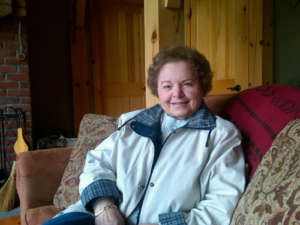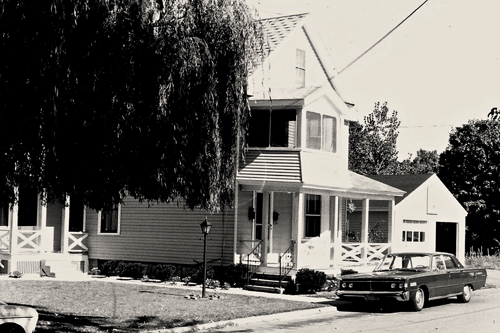 What does the concept of “home” really mean to us? Does it mainly refer to a place that gives us a feeling of utmost security in our surroundings? And, whatever it might mean, as we age, is it possible to transfer our sense of home to another spot on the map? In my mother’s case, circumstances are forcing her to ponder these very questions.
What does the concept of “home” really mean to us? Does it mainly refer to a place that gives us a feeling of utmost security in our surroundings? And, whatever it might mean, as we age, is it possible to transfer our sense of home to another spot on the map? In my mother’s case, circumstances are forcing her to ponder these very questions.
The first thing people notice about my mother, Theresa “Terri” Farr, is that she doesn’t look 86. The skin on her face barely betrays a wrinkle. Blessed with some favorable genes on her maternal side (her mother lived to be 105), she could easily pass for someone in her 70s. Mom will tell you that people have always misjudged her age. On that account, she’s often related the story about her honeymoon trip to North Carolina in the late 1940s, when she was meeting some of my dad’s relatives for the first time. After getting a look at Mom, one uncle pulled my father aside and asked him, with tight-lipped Southern bearing, “Now, George, have you taken a child bride?”

Since Dad’s death from cancer in 1997, Mom continues to make her home in the small New England town she’s lived in all her life—Easthampton, Massachusetts (pop. roughly 17,000). Shortly after Dad passed away, Mom sold their house and purchased a small condo in the center of town. She’s lived there independently since.
She does have family besides me. I live in Vermont, and my three siblings have all relocated to Maine.
Age Has a Price
As youthful and active as she might appear, Mom hasn’t fully escaped the depredations of aging. She’s had some health challenges. Nine years ago, she slipped on a patch of ice in front of her condo and broke her left hip. Although she was back on her feet fairly quickly, she’s lost her sense of balance and is often unsteady, even falling sometimes. On top of that, in 2007, she suffered a heart attack; she’s mostly recovered from it, but it’s also slowed her down.
Mom readily admits, “I can’t remember things anymore like I used to.” Typical of people her age with short-term memory loss, she often finds herself confounded by small tasks: how to set the timer on a new radio alarm clock or navigate email and social media on her computer. “Unless I do something over and over again, I forget how to do it!” she often complains.
Over the past couple of years, like millions of baby boomers with aging parents, my siblings and I have been discussing Mom’s future with her—and how to prepare for a time when it’s no longer prudent for her to handle things entirely on her own. The topic is one we’re all loath to discuss because we understand that, however we might try and smooth Mom’s transition to another “living situation”—as we indirectly refer to it—it’s not going to be easy for any of us, especially her. After much back and forth, we finally decided that she’ll move into a senior community in Rockland, Maine, where my sister lives. Part of the reasoning is that my sister’s husband is a doctor and will be able to keep a watchful eye on her health and well-being. Another is that several of her grandchildren live in Maine, which will enable her to see them more often. So, somewhat reluctantly, Mom has put her name on the waiting list for one of the tiny, two-room apartments in the community. When one becomes available, she has to be prepared to move within a month’s time.
Sacred Routines
The idea of moving—anywhere—doesn’t sit comfortably with my mother. In a way, her life has been remarkably sheltered within the confines of her town. As she would say, she knows Easthampton by heart, and the pattern of her life there is a testament to how intertwined and interdependent her persona is with the character and rhythms of that town.

When, annually, Mom volunteers to stand outside the local bank with a bagful of tiny red papier-mâché poppies, handing them out in exchange for donations to benefit the town’s veterans’ organization, dozens of townspeople stop to greet her and share a few words of conversation. She’s on a first-name basis with Ed, the local grocer, and knows precisely where the items she needs are stocked in each of his store’s aisles.
Observing the pattern of her day-to-day life around Easthampton, I sometimes think she’s like a blind person touching Braille: She intuits how to sidestep the frost-heaved bumps in the walks and maneuver her car around the potholes in the local roads. She knows every curve and stoplight, every path and park bench, and what they signify—practically and symbolically.
This is my mother’s town—her canvas—and she loves it.
Home as a Mirror
In her book, House as the Mirror of Self: Exploring the Deeper Meaning of Home, Clare Cooper Marcus, a professor emerita of architecture at the University of California at Berkeley, ponders the meaning of the word home as it’s interpreted by the more than 100 people she interviewed. But she doesn’t consider the term literally, within the narrower definition of “home” as it refers to kitchen and den, mortar and bricks. Instead, she examines how our concept of home in a more figurative sense influences our self-image and emotional well-being. She explores those particularly subtle bonds of feeling we nurture for dwellings and locales we’ve lived in, past and present. Marcus’s book is based on a rather straightforward premise: that as we change and grow throughout our lives, our psychological development—our very self—is deeply influenced by our physical environment.
Cathy Comstock, a Boston-area clinical social worker whose practice is focused on the elderly, thinks the challenges to those who are uprooted from their longtime home are hard to overcome, particularly if they happen to be elderly. “It’s incredibly difficult,” she says. “They’re giving up everything—the streets they know, their home, their community, their neighbors. And it’s not only those physical aspects; it’s also losing familiar sounds, smells, weather conditions. All of these ‘sensory data’ play a role. It’s truly being uprooted—almost like a plant would be—and going into a form of shock. It’s ‘shocking’ to the human system because people have to come to terms with so much loss at one time.
Room to Move
A lot of Mom’s recent time has been devoted to downsizing her furniture and keepsakes and doling them out to her children. One afternoon last month when I was visiting, Mom and I sat at the dining room table and went through old family snapshots. I was touched to see her study them, one by one, and then consign them to one of four boxes marked with each of her children’s names.
But downsizing isn’t the most pressing thing on her mind. Her chief concerns are twofold: that she’ll have a hard time making new friends in her new community, and that she’ll have to relearn a new landscape—a new routine.
“I would have to say my greatest fear right now is that I won’t know where to go to do the things I have to do,” she shared with me. “It’s a smaller town—6,000 people—and in time I think I can learn it, but I get nervous driving in places I’m unfamiliar with. My ability to adapt to things has diminished. I don’t like change or new things happening. I don’t have as much confidence in myself as I used to.”
So I asked her: Do you think you could ever come to regard your new place in Rockland as “home”?
She was quiet for a minute and then said, “It’s hard to tell, but probably not. Even now, I don’t like to be away from my home—this home—for a long time, so I’m just not sure. But what does give me a sense of hope about it is knowing that my daughter will literally be on the next street and that most of my other children will be closer than they are now.”
She paused again, and in that moment something shifted. I saw in my mother’s face a look I’ve seen thousands of times over the past 60-plus years: a hopeful, forward-looking expression, one that comes from having practiced a lifetime of finding the brighter side of any setback, no matter the challenge. The corners of her mouth turned up into a slight smile.
“Let’s hope they know how to play poker in Rockland, Maine,” she said.
Click here to see Rose’s tips for healthy and happy relationships



6 Comments
Ralph Pace
Bruce: Wonderfully and sensitively written. Your mother seems to have an honest grasp of what home is – and isn’t. Ralph
Jamie Jarvis
Well said – it’s a lovely and heartfelt piece, Bruce.
Jerry Chichester
Bruce, a sensitive and loving exploration of a painful facet of the choices and challenges older folks eventually face. My mother-in-law is wrestling with several similar aspects of this issue. Thanks for the sensitive insights.
Marie Ruffino
Beautifully written. Our minds, our spirit unlike the bodies we live in stay forever young. Bruce’s mom is truly an inspiration in the way that she accepts the physical limitations put upon her by her aging body. Difficult as it may be she gracefully accepts what her next step must be. Life is all about change whether it be bad or good. It’s how we go about accepting the changes and moving toward and then past them that defines what is inside of us. When we face change and grace through it we allow the spirit to emerge and get us through. That’s the mystical part that ocuppys our bodies and keeps us forever young.
Jeanne Sepersky
Hi Bruce: Beautiful story about your Mom and so beautifully written.
I intentionally pulled up your name on Google to find out your whereabouts.
I know you are a busy man so when you get a chance, please email me. I will let you know why I am writing. Sincerely, Jeanne
David A. Banas
Great story, Bruce!
Somehow, though, knowing your love and knowledge, I expected no less from you.